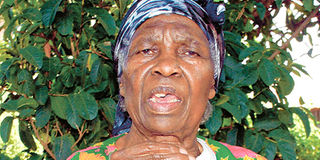Why I long for life in years gone by

The different faces of Esther Wangari Karanja, 81, during the interview. Photos/MICHAEL MUTE
What you need to know:
- The perspective of an 81-year-old great grandmother on the woes facing country
Were Esther Wangari Karanja to have her way, she would want a country where everyone lives and loves everyone else without discrimination; where all co-exist, working together for the good of Kenya and sharing equitably all that Kenya has to offer.
In fact if she could live her life all over again, the 81-year-old mother, grandmother and great grandmother many times over, would want to live out her second chance in pre-independence Kenya and maybe a tiny bit in the first few years of independence.
Born in Kipkelyon in 1928, Wangari has seen Kenya go through the bad, the beautiful and the ugly of times. She remembers with nostalgia her early years; the period between 1940 to 1952 living and working among the Kipsigis in Sotik, where her parents settled from Rwathia in Murang’a.
Different tongue
In those days, she said, all the people of Kenya were one. They did not even have distinctive tribal names for one another, they used whatever endearment or epithet they felt best described a person who spoke a different tongue or behaved in a manner not familiar to them.
Regrettably those names would later, with the advent of the white man and the enlightening of some Africans, be termed derogatory.
According to her everyone, the Kikuyu, the Luhya, Luo, Kipsigis and other tribes lived and worked happily together. She recalled how when working on the flower farms in Sotik, the communities who were separated only by cultural differences in that they built their settlements according to their culture, dressed and stayed together in clusters, were not divided or biased against one another.
She said they came together in times of tragedy to mourn and in joy to celebrate as one.
Then the country was a haven of peace and security. She told how as young women and men, they roamed the villages for miles at night, going from dance to dance without fear.
There was absolutely nothing to fear she said, because everyone was a friend and the only cases of theft they knew was that of goats and sheep and even then, if someone was caught driving out another’s animals, the thief just walked away to try another day.
That is the kind of country she dreams of. But life was not always a bed of roses the white man brought with him restrictions on movement and forced the people to work on the farms.
She hated the slave labour and meagre wages—between Sh4 and Sh8 annually—everyone received at the end of one whole year of backbreaking work. But make no mistake, when that shilling came, it went a long way, buying delicacies like sugar and necessities like clothes for the family.
“We were like one big happy family, sharing what little we had. At night during the full moon, we trekked long distances visiting one another. No one would dare stop you. There were no thieves even the police were friendly and helpful. There was joy and peace all around”
She recalled how returning home one day, she found her young son on the verge of death. The boy, Gacheru had gone without food for days while his mother and others were in the forest searching for the Mau Mau as ordered by the Colonial masters.
“When I saw him lying there, I knew he would die if I did not work fast,” she said she ran to the nearest shop without a coin in her hand and asked for bread and milk, then ran back passing through a restricted area and got home just in time to save her dying son.
“There were home guards, mainly Kipsigis, along the way but they did not stop me. They sensed I was in trouble so they left me alone. The shopkeeper, a man I had never seen before also sensed my distress and chose to help without question. Because of them, my son is alive today,” Esther said
Today Esther laments, that people, especially women and children, die everyday because of hunger. They have no food to eat because a few greedy people have taken all there is and those that survive the hunger die in unnecessary tribal wars.
Tribal lines
She wonders why Kenyans are so polarised along tribal lines yet many, especially those in leadership positions, were born and raised in an era where tribal animosity was unheard of.
She is not convinced that a people who have lived side by side for decades could suddenly turn around to maim and kill one another no matter what the circumstances. She, like many other people believe the so-called tribal clashes are nothing but the product of an inciting and hateful few, who want to benefit from the loss of others.
In her opinion, these evil people have been able to thrive and carry out their schemes because of a lack of sound leadership at the top and a police force that is compromised.
Comparing the leaders of today and the tribal chiefs who reigned in the olden days like the late chief Kinyanjui wa Gathirimu, Waiyaki wa Hinga and those that came after them in the colonial days, she said the leaders of today lack wisdom- a requisite quality of a bonafide leader.




